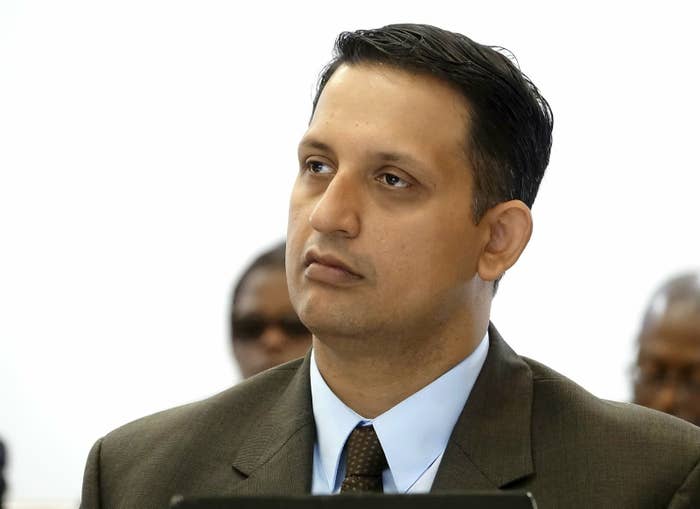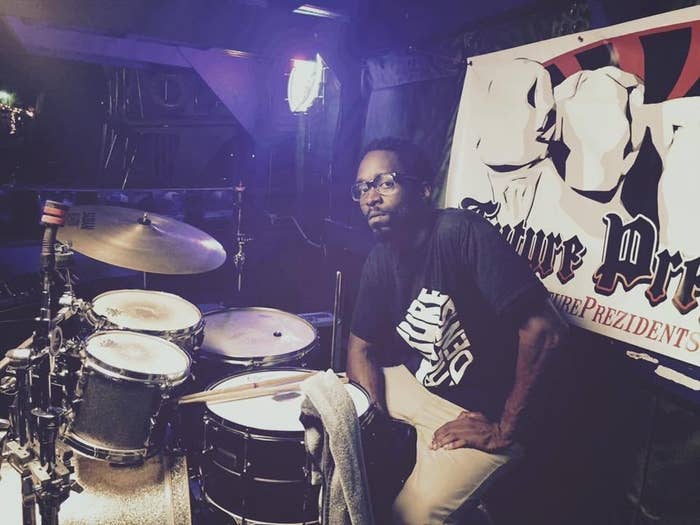
An ex–Florida police officer, Nouman Raja, was found guilty of manslaughter and attempted murder Thursday for shooting and killing a black man in 2015.
The verdict means Raja, who is of South Asian descent, is the first officer in Florida to be convicted of an on-duty shooting in 30 years, the Associated Press reported.
Raja was fired from the Palm Beach Gardens Police Department shortly after the shooting and has been under house arrest since being charged in 2016.
A Palm Beach County jury reached its verdict after deliberating for more than four hours over two days.
Raja, 41, now faces 25 years to life in prison for killing a 31-year-old stranded black driver, Corey Jones.
On Oct. 18, 2015, Raja was on duty in plain clothes and in an unmarked cargo van while investigating late-night auto burglaries in the area. Jones, a drummer for a reggae band, was driving on the highway after returning from a performance when his car broke down.
Around 3:12 a.m., Jones was on a phone call with a roadside assistance call center to explain his car's mechanical problems, according to the criminal complaint. He had a handgun with him, which he had legally purchased days earlier to safeguard his $10,000 drum set in his car, the AP reported.

About a minute later, Raja drove his unmarked van the wrong way up an off-ramp and approached Jones' vehicle.
At the time, Raja was dressed in casual clothing and did not have a police badge or tactical vest on, despite being advised by his supervisor to wear his vest and identify himself as a police officer while on assignment.
Prosecutors said that at no point did Raja indicate to Jones that he was a police officer when he approached his stranded vehicle.
The brief verbal exchange between the two men was recorded as part of Jones' phone call with the roadside assistance center after he opened his car door.
Jones: "Huh?"
Raja: "You good?"
Jones: "I'm good."
Raja: "Really?"
Jones: "Yeah; I'm good."
Raja: "Really?"
Jones: Yeah."
Raja: "Get your fucking hands up! Get your fucking hands up!"
Jones: "Hold on!"
Raja: "Get your fucking hands up! Drop!"
Jones then got his gun out and ran away from his car, as Raja shot at him six times in the span of 13 seconds, according to court documents.
During the shooting, Jones threw his gun away in the grass as he ran from the car, prosecutors said. Three of Raja's bullets struck Jones, one of which fatally struck his chest.
After shooting Jones, Raja called 911 and told the dispatcher that Jones had exited his vehicle with a handgun and that he had given him commands to drop the gun.
"I identified myself and he turned, pointed the gun at me, and started running," Raja told the 911 operator, according to court documents. "I shot him."
Raja told officers at the scene that he had seen Jones throwing his handgun in the grass near the back of his car while running away.
Jones' body was found 192 feet away from the back of his car, his gun 72 feet away.
The shooting drew attention to Florida's controversial "stand your ground" law, which Raja's attorney initially invoked in an unsuccessful attempt to dismiss his charges.
Police officers in the country rarely get charged for deadly shootings, and it is even rarer for them to face trials and get convicted, according to Philip Stinson, an associate professor of criminal justice at Bowling Green State University who studies crimes committed by law enforcement officers.
Most officers are cleared of wrongdoing in fatal shooting incidents by investigators, prosecutors, or juries who believe that they are justified in using deadly force to defend themselves or others, Stinson told the New York Daily News in 2017.
The last time a Florida officer faced a trial for an on-duty killing was in 1989 when a Latino officer, William Lozano, fatally shot a black motorcyclist, which also resulted in the death of a passenger, the Associated Press reported.
Lozana was convicted of manslaughter, but an appeals court dismissed the verdict, ruling that the case should have been moved out of Miami due to the racial tensions the shooting sparked in the city. Lozano was acquitted during a retrial in Orlando four years after the shooting.
